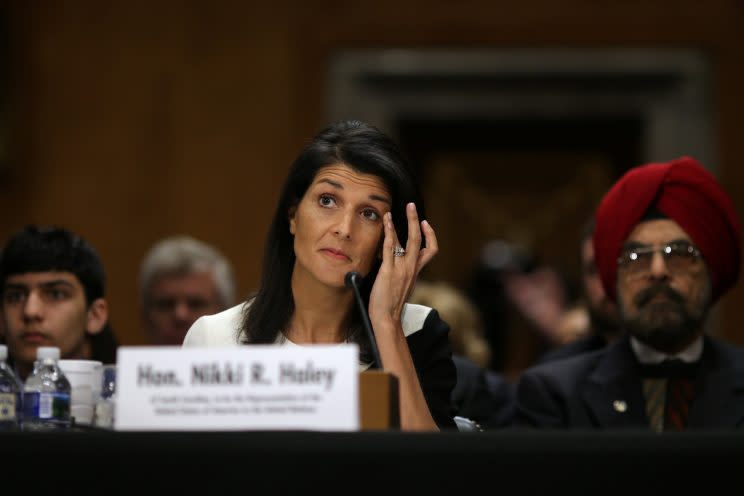Nikki Haley says Trump advisers will ‘educate’ him on foreign policy

President-elect Donald Trump’s choice for ambassador to the United Nations said Wednesday that she hopes to be part of a national security team that will “educate” Trump, and that she wants to change Trump’s mind about the importance of the organization.
“He had made comments about the U.N., but those are not my feelings,” said South Carolina Gov. Nikki Haley.
“I will show him that the U.N. matters. … Hopefully we can get him to see it the way we see it,” she said.
Trump has recently dismissed the U.N. as little more than “a club for people to get together, talk and have a good time.”
“When do you see the United Nations solving problems? They don’t. They cause problems,” Trump said in December. “So, if it lives up to the potential, it’s a great thing. And if it doesn’t, it’s a waste of time and money.”
Haley and many of the senators questioning her on the Senate Foreign Relations Committee did voice many criticisms of the United Nations’ shortcomings — most notably what Haley called its “long history of anti-Israel bias” and sexual abuse by U.N. peacekeepers against civilian populations they are supposed to protect. However, they also acknowledged the importance of the organization and its successes, and noted that if the United States cuts back on its role in the organization, China and Russia and others will fill the vacuum.
More broadly, Haley expressed sharp differences with Trump on a range of foreign policy issues, continuing a trend among the president-elect’s nominees for top military and diplomatic posts.
Like Trump’s nominee for secretary of defense, Ret. Gen. James Mattis, Haley affirmed the importance of the North Atlantic Treaty Organization, only days after Trump said NATO was “obsolete.”
“I think NATO is an important alliance for us to have,” Haley said. “I think it’s one we need to strengthen.”
Haley also said that Trump no longer wants to ban all adherents of the Muslim faith from entering the United States, as he proposed in December 2015. “The president-elect has corrected his statement,” Haley said.
Haley was a vocal critic of Trump during the Republican presidential primary, particularly when he announced the idea of such a ban idea in her state. Haley called Trump’s idea “an embarrassment” and said it was “absolutely un-American” and unconstitutional. She said at the time that “it defies everything that this country was based on, and it’s just wrong.”
Trump’s campaign never removed from its website his announcement of the proposal for a ban on Muslims entering the country, and Trump has refused to say it was a mistake, but he has shifted his focus to excluding from the country immigrants from areas and countries associated with terrorism.
Haley gave a general disavowal of Trump statements she disagrees with.
“Any comments that the president-elect has made, those are his comments,” she noted.
The 44-year old mother of two and two-term governor argued that Trump will be more restrained as president than he was as a candidate, in part because she and others on his national security team will help him to understand the consequences of his words and actions.
Haley, asked by Sen. Chris Murphy, D-Conn., for reassurance about the differences between Trump’s statements and those of his nominees, said it is “natural for a candidate or an incoming president to look at everything and to say things. Once you govern, it becomes very different.”
“Once the president-elect gets to hear from his national security team, I think what he says after that will be most important,” she told Murphy. “And I think those are the focuses that we are going to have with the National Security Council and making sure that we educate and inform him of what we know … and go along with whatever decision he decides to make.”
A few of the senators on the panel pressed Haley on questions that exposed her inexperience in foreign affairs, but the only notable criticism came from Sen. Tim Kaine, D-Va., on the U.S. agreement with Iran on its nuclear program.
“I would encourage you to read the agreement, because what you just stated about the agreement is quite inaccurate,” Kaine told Haley, after the governor said Iran had been given a “free pass” to acquire nuclear weapons after the agreement expires.
Haley did not give a clear indication as to whether she would support withdrawing from the Iran agreement, but certainly did not sound as if she would advise for it. She was even more vague on where she stood in regard to the U.S. involvement in the 2016 Paris Accord climate agreement.
But Sen. Ben Cardin, D-Md., the top Democrat on the committee, was enthusiastic about Haley’s skills and personality. He told her he thought she would “speak truth to power” both when it meant standing up to Trump if she disagreed with him, and when it meant pushing back against Russian and Chinese representatives in the U.N. who seek to put the U.S. on the defensive.
“I’m convinced that you’re going to speak up for what’s right,” Cardin told Haley.
Committee chairman Sen. Bob Corker, R-Tenn., said the committee would vote Monday on Haley’s confirmation.
“I’m certain that you’re going to be confirmed overwhelmingly,” he told her.

 Yahoo Sport
Yahoo Sport 







































